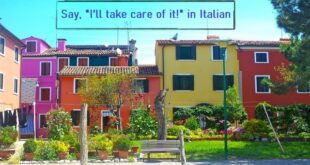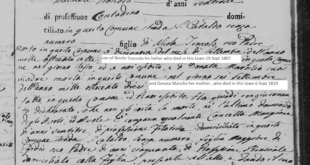I have two types of friends: the kind that has a list of 47 things to do and remembers to do every one of them in order, and then there’s the other kind. I forget what it’s called! Forgetful!
Early in the morning, I am highly caffeinated, alert, focused, and capable of getting a lot of things done (like writing my column!). Right after lunch, I might as well be asleep. I think I know why our forebears and Italian cousins like to take that nap in the afternoon!
Without ever meeting them, it seems like the clerks who wrote the genealogy records of two centuries ago had the same kind of work day that I do! I have been working a lot lately with Italian civil birth records and also Catholic Church records from the 1700s. In the process of trying to match up every record with a correct set of parents, I have found that the clerks who wrote the records were not always at their best. A little tired, perhaps. Too much homemade vino. We’ll never know the reason. But the lesson for today is that you cannot always trust the records themselves. You have to use other records to check the accuracy of the record you were looking for in the first place. I’ll explain what I mean.
My first classic example of a genealogy brain-cramp comes from the year 1793. The archpriest (pastor) of the mother church of Triggiano must have just finished three Holy Week masses and maybe he polished off the chalice full of wine all three times. Then he had to baptize a baby born the last week of March, so he wrote in Latin, “I, the undersigned priest, baptized on this day, the thirty-second day of March in the year 1793….” Yes you read that correctly. Believe me that I checked it a dozen times. They wrote the date in long hand rather than digits. “trigesimo second” And in the body of the document, he wrote that the baby was born on the thirty-first of March. “Trigesimo primo”. At first, I thought it was some change in the calendar. I know they switched from the Julian calendar to the Gregorian. But that happened in 1582. The calendar of 1793 is the same as today, and the last time I checked, there was no March the 32nd!
In other records, they wrote three or four baptisms in the book on the same page, sequentially. In at least a dozen cases between 1787 and 1815, they had baptisms with dates such as:
September 9
September 10
October 14
October 18
September 22
September 25
Once again, since they write the months in longhand, there is no confusion regarding digits that look alike. This priest just slipped into the wrong month and then corrected himself.
I want to be clear that I am not talking about one particularly bad bookkeeper. There are multiple priests and clerks who commit these mistakes, and frankly there are not that many mistakes all things considered. In the baptism books, there are entries of a full paragraph, and then the entire entry is crossed out, and the word “error” written on the margin several times, and then right below it, the same person is baptized with the record written clearly. So they were aware that if there was a mistake, they were to start over. (They didn’t invent liquid paper until much later!) So when they caught the mistake, they handled it very professionally. Sometimes, as we have seen, they didn’t realize the mistake. In the civil records, they wrote a name, and if they realized the name was wrong, they did not cross it out. They wrote the word “dico” and then corrected the name. Sort of “oops! My bad!”
So what does this all mean to the researcher who sees these problems? For one thing, I am not able to enter in my genealogy software that this baby was baptized on March 32nd, 1793. The computer will not accept it as a valid date. I could choose to enter a baptism date of March 31st or April 1st. In either case, the important entry is to mark my source citation with the mistake: “Baptism record states March 32nd 1793” so that the next person who looks for that record will be able to find it.
What about the baptism month being wrong? Unfortunately, the middle of these records just lists the day of birth. “…baptized the baby born on the twelfth…” So if the month of baptism is wrong, and it seems to be, then the birth date itself is also wrong because the record says that baby was born October 12th when in all likelihood it was born September 12th. This is a conundrum. If I put a birth date of October 12th, it is probably inaccurate, and this will really come home to roost when the same baby died September 19th of that year, aged 7 days. If I make the leap of logic and put September 12th, then the next researcher looking for this record will look in the September records and not find it. In this case, it is important to include a copy of the record as the source rather than just “Triggiano Baptism Books” because the date itself prevents us from finding the record in the books. Hopefully your baptism book has page numbers stamped on it. Then you can cite the source as page 241, which will allow the other researcher to find the record. Then put a note on the citation saying “Baptism says October 14th and birth says October 12th, but the record is located in the midst of September baptisms. Therefore it is most likely a September baptism and birth.”
Keep in mind that the baptism and birth dates are not always the only things that can be wrong on a record. If the clerk or priest had a rough night and is writing things down wrong, they can also mess up the parents’ names. And lemme tellya, boy they have done that. I’ll talk about how to work around this next month.
If you have any questions, send me an e-mail at italianroots@comcast.net and please put “Fra Noi” in the subject line. Have fun!
 Fra Noi Embrace Your Inner Italian
Fra Noi Embrace Your Inner Italian






